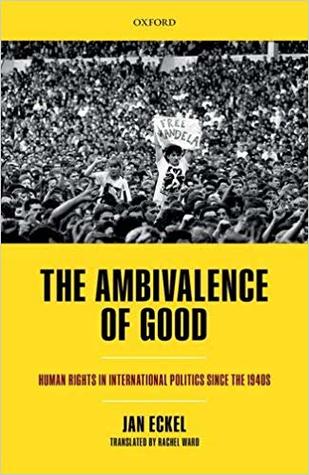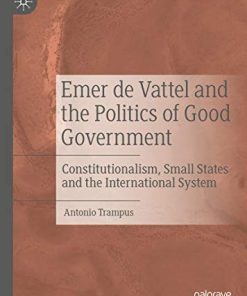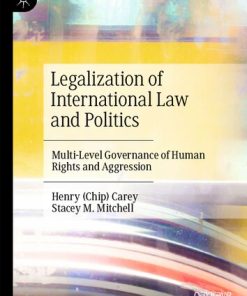(Ebook PDF) The Ambivalence of Good Human Rights in International Politics since the 1940s 1st edition by Jan Eckel 0191086118 9780191086113 full chapters
$50.00 Original price was: $50.00.$25.00Current price is: $25.00.
The Ambivalence of Good: Human Rights in International Politics since the 1940s 1st edition by Jan Eckel – Ebook PDF Instant Download/DeliveryISBN: 0191086118, 9780191086113
Full dowload The Ambivalence of Good: Human Rights in International Politics since the 1940s 1st edition after payment.

Product details:
ISBN-10 : 0191086118
ISBN-13 : 9780191086113
Author: Jan Eckel
The Ambivalence of Good examines the genesis and evolution of international human rights politics since the 1940s. Focusing on key developments such as the shaping of the UN human rights system, decolonization, the rise of Amnesty International, the campaigns against the Pinochet dictatorship, the moral politics of Western governments, or dissidence in Eastern Europe, the book traces how human rights profoundly, if subtly, transformed global affairs. Moving beyond monocausal explanations and narratives prioritizing one particular decade, such as the 1940s or the 1970s, The Ambivalence of Good argues that we need a complex and nuanced interpretation if we want to understand the truly global reach of human rights, and account for the hopes, conflicts, and interventions to which this idea gave rise.
The Ambivalence of Good: Human Rights in International Politics since the 1940s 1st Table of contents:
1. Prologue: The ‘Pre-History’ of Human Rights as a Historiographical Problem
Recent and Distant Pasts
Experiences of the Interwar Period
Securing Human Rights to Prevent War—Discourse in the Early 1940S
An Unintentional Founding Act: Human Rights and The Creation of the United Nations
Part One: The 1940s to the 1960s
2. Human Rights Policy in the United Nations
Human Rights as Propaganda and the Campaign Against Forced Labour
Multipolar United Nations and the Long Death of the Convention on Freedom of Information
Defusing the Cold War and the Innocuous ‘Action Programme’
No Room For Agency: The United Nations as a Weak Player
3. Human Rights in the Council of Europe and in the Organization of American States
Primacy of Non-Intervention: The Restructuring of the Inter-American System
Reluctant Founding Consensus: The European Convention on Human Rights
Sleeping Beauty: The European System in (Non) Practice
Regional Security in Times of Revolution: Activating the Inter-American System
4. NGOs and Human Rights
Déjà Vu: The Redefinition of Liberal Internationalism
Admittedly Unsuccessful: The International League for the Rights of Man
Tentative Strategies: Human Rights as Self-Defence
Disappointment as Leitmotiv: NGOs and the International Revolution that Never Happened
5. Human Rights and Decolonization
Anticolonial Appropriations—and Rejections. Human Rights in the Struggle for Independence
Morality Without Human Rights. Western Anti-Colonialism and Solidarity with Algeria
Inverted World. Decolonization and Human Rights in the United Nations
Side Stages. Human Rights and the End of Colonial Rule
Part Two: The 1970s and 1980s
6. Amnesty International and the Reinvention of Western Human Rights Activism
Two Organizations: Amnesty in the Sixties and Seventies
Revolutionizing International Policy
‘Every Day I Feel his Pain’. Grass Roots Activism—The Example of Aiusa
Peak Impact: The Eighties
7. Human Rights in Western Foreign Policy
The Discovery of Human Rights
Social Protest, Interdependence, Morality—Layers of Motivation
From Visions to Policy—Institutionalizing Human Rights
Complications—Human Rights in Practice
Fleeting Ideals—Human rights as the Governments Fall
Human Rights in Opposition: Conservatism in the USA and West Germany
Conservative Reinterpretations
Anti-Communism and Democratization— Making Use of Human Rights
Emerging Fundamental Consensus
8. The Pinochet Dictatorship in International Politics
The Interlaced Dynamics of Mobilization
Human Rights as a Shared Language
Punishing Chile and Battling for Information
‘We Carry on as Before.’ The Effects of Human Rights Criticism
Conservative Revolution: Human Rights and The End of the Regime
The Impotence of Human Rights: Genocide in Cambodia
9. Human Rights, Communism, and Dissidence in Eastern Europe
Human Rights in State Discourse after the Second World War
Anti-Utopian Self-Fulfilment: Dissidence and Human Rights
Unforeseen Impact: The CSCE Process
Reforms with a Life of their own: Human Rights and the Collapse of communism
10. Human Rights in the Postcolonial World
The ‘Third World’ as the Site of ‘Human Rights Abuses’
Interfering to Prevent Interference: The African Human Rights System
On The Failure of Moral Arguments: Human Rights and the New World Economic Order
Inventing a Tradition: African Human Rights
Conclusion
Human Rights in International Politics From the 1940s to 1990
Conscious Dilemmas: Human Rights Policy Since the End of the Cold War
People also search for The Ambivalence of Good: Human Rights in International Politics since the 1940s 1st:
the ambivalence of the sacred
the ambivalence
moral ambivalence definition
what is the role of ambivalence in motivational interviewing
ambivalence of good and evil
You may also like…
Politics & Philosophy - Social Sciences
Jurisprudence & Law - Environmental Law
Jurisprudence & Law - Criminal Law & Procedure
Advocates of Humanity: Human Rights NGOs in International Criminal Justice Kjersti Lohne
Politics & Philosophy - Government & Politics
Jurisprudence & Law - Foreign & International Law
The Law of International Human Rights Protection 2nd Edition Walter Kälin
Jurisprudence & Law - Foreign & International Law
Disability in International Human Rights Law Gauthier De Beco
Politics & Philosophy - Government & Politics Society
Jurisprudence & Law - Foreign & International Law












